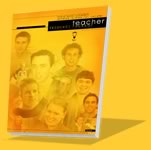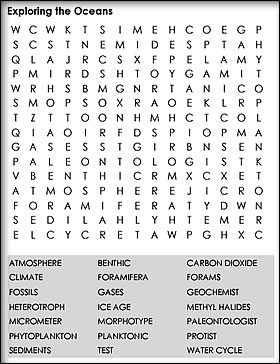 Links to the essential learnings: Links to the essential learnings:
Thinking:
-
Inquiry:
Students will have the opportunity to ask questions of visiting scientists, during their visit, or by email – they may be interested in an aspect of the research, or in why the scientist chose to follow a particular topic or career path.
Communicating:
-
Being Information Literate
-
Being Arts Literate
Students will be able to access information about the Young Tassie Scientists and their work on the website, through links to other relevant sources of information, by email. They will then be able to share meanings of key ideas and present their own interpretations by creating artworks (paintings, drawings, collages or digital images).
Personal Futures:
-
Building and Maintaining Identity and Relationships
-
Creating and Pursuing Goals
Students will hear personal stories of Young Tassie Scientists - what influenced them to study science, why they chose their particular career pathway, what their goals are and how they plan to achieve them.
Social Responsibility
-
Building Social Capital
Students will learn of the interdependence of individuals, groups, institutions and organisations, all of which are involved in some way in the scientific process – whether this is on a personal level (friends and colleagues), on an academic level (universities and research organisations) or an applied level (industries and communities). They will have the opportunity to discuss and assess the social capital of the science being presented, in addition to its relevance in daily life.
World Futures:
- Understanding Systems
Your students will have the opportunity to learn about systems in the biological, chemical and physical areas, for example, phytoplankton affecting climate change and artificial intelligence driving wind power systems.
Read about the innovative work of these twelve Young Tassie Scientists who are not only making progress in their chosen field, but also have fascinating stories to tell.
Go to the suggested websites to find more information on the scientists and their research.
Invite a Young Tassie Scientist to come and speak at your school before or during National Science Week (14 - 22 August).
For bookings, contact Fiona Taylor at the University of Tasmania’s Faculty of Science, Engineering & Technology ph: 6226 2845 email: Fiona.Taylor@utas.edu.au
Involve your class in eLemental, the science art exhibition for school students, and create your own science-inspired artwork (painting, drawing, collage or digital image).
See section 5.0 for competition guidelines or for more information, contact Kim Menadue ph: 0419 983202 email: jexsouth@netspace.net.au
Initial activities might centre around Understanding the science of the Young Tassie Scientists. Follow-up activities can focus on Interpreting the science in an artistic way.
Your students have the opportunity to exhibit their artworks in the schools student exhibition eLemental. Through eLemental your students can witness how other school students from all over Tasmania as well as university art students (eMerging exhibition) have interpreted the same science.
Ideas for you and your students!
Initial activities might centre around Understanding the science of the Young Tassie Scientists. Follow-up activities can focus on Interpreting the science in an artistic way.
Your students have the opportunity to exhibit their artworks in the schools student exhibition eLemental. Through eLemental your students can witness how other school students from all over Tasmania as well as university art students (eMerging exhibition) have interpreted the same science.
Understanding the research of Young Tassie Scientists:
Key words and word puzzles:
Discuss the meaning of the key words relevant to each Young Tassie Scientist’s area of research and/or each science theme. The key words are listed at the end of each scientists’ profile.
It’s fun making puzzles with key words. We have provided an example of a word puzzle for the “Exploring the Oceans” theme. You can make your own puzzle for the other science themes with help from this website: https://school.discovery.com/customclassroom/userguide/puzzlemaker.html

Talk to a Young Tassie Scientist:
If you have invited a Young Tassie Scientist to your school, students can prepare for their visit by formulating questions they would like to ask the scientists about their research. Discussing and understanding the key words, and exploring the weblinks will help the students think of questions you would like to ask.
If you don’t have a visit planned students can contact a Young Tassie Scientist on email.
Discussion and debate topics:
-
How is this research relevant to your daily life and/or your life in the future?
-
What do some of the scientists have in common (e.g. necessary skills, application of their research, background education i.e. maths/biology/chemistry)?
-
What do some of the research topics have in common?
-
How will this research help future generations?
-
What are the pros and cons of technologoy used or developed in the research?
Interpreting the research of the Young Tassie Scientists
A picture tells a thousand words….
The follow-up activities can be used to create artworks for the eLemental exhibition and competition. Artwork can demonstrate students’ understanding of the science. Artworks can be created individually, in groups or as a class. The possibilities for interpretation are infinite!
Some ideas (we are sure you have plenty more!)
Forging links between art and science
We are inviting you to participate in the student art exhibition eLemental. What are some of the common skills used by artists and scientists? For example, think of the skills and process the Young Tassie Scientists employed to undertake their research. As an artist, what skills are required before and during the creative process?
Illustrating what you have learned
- If you were to meet someone from another planet who didn’t understand words - how would you explain your understanding of the science theme?
- Draw an aspect of the science theme on micro and/or macro scales – how would it look to an ant? Or a giant?
- Show through a collage how this science is relevant to you.
- What would the future look like if this science was used in everyday life?
|




